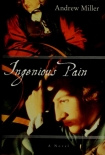Ingenious pain by Andrew Miller (best young adult book series txt) 📗

- Author: Andrew Miller
Book online «Ingenious pain by Andrew Miller (best young adult book series txt) 📗». Author Andrew Miller
As for James, no man could seem less ardent, but his composure inflames her, draws her deeper into the indignity of her passion. She cannot help herself. Soon she does not care who sees, who knows, who gossips. She has never felt so free, so hugely embarrassed. She discovers in herself a cunning, a salaciousness, a daring she would never have suspected. She is a stranger to herself. Everywhere there is the marvellous whiff of imminent disaster.
The town is amused. Nothing diverts it more than a domestic farce, and the more stolid, the more respectable the players, the better it is liked. What did Munro expect, a man of his years marrying a green, headstrong woman like Agnes Munro? And
then to invite that creature Dyer into his house. Half the women of Bath would lie down for him, particularly the married women. Does Dyer return her passion? No one can say, for when they search it appears he has not a single confidant, not a single friend, other than his henchman Marley Gummer. And Munro himself, of course.
New Year 1762. The festivities bring on a recurrence of Munro's gout. He is put to bed on a diet of steel and angostura bark. James and Agnes spend their evenings by the fire in the drawing room, drinking tea and playing backgammon. She asks him about his life; he tells her nothing, or nothing she actually believes. She invents a life for them both. A life of glamour, of riches, of curly-haired children called George or Caroline or Hester; of a house in Grosvenor Square, of neighbours' envy. Lord, what if her husband were to die? What then?
James gammons her, sips his tea, looks up at her. He understands what is required of him. She is there to be taken, part of the world's munificence. When the pot is empty, the last game finished, and the candles, good wax candles with their clean smell, are down to the last inch of their lives, he crosses over to her, lands a kiss on the hot of her mouth and fingers her into a sweat. She jerks her head back, shudders, kicks, sends the card table, the board, the counters tumbling over the blacks and sumptuous reds of the new carpet.
She sobs, cannot stop herself from asking if he loves her, truly, as she loves him, utterly, for ever, ever and ever.
James is setting up the board again, laying out the counters on their leather spikes. Agnes is on her knees beside him. He does not know what she is saying. Is she happy, afraid? Frankly she seems drunk. He helps her to her feet, answers all her questions with yes, yes, yes, of course. He is thinking of the twins, of pearls and boiled eggs. The memory of them is like a finger pressing his chest. He stares at the miniature of Munro above the mantelpiece.
tries to clear his mind. Molina's studio, the light there, the light in the girls' hair as they slept. The finger presses harder. It is like the tip of a cane, but hot. He does not Hke this feeling. Shakes his head to clear it. Agnes asks: 'Are you well, my love?' He says something to her, he does not know what, and makes for the door. The stairs are immensely long. He hauls himself up by the banisters. His heart is beating violently. He is afraid he will not reach his room. Munro is snoring. Is that Canning's voice? Canning?
'What did you expect, James?'
'Not this!'
'No one is safe, James. Not even you. Especially not you.'
He is lying on the bed. There is a small fire in the room. His hand hurts, his fist is clenched. He opens it. He is holding the dice from the backgammon. He lets them roll on to the floor. He lies a long time, uncertain if he is awake or dreaming. Some perceptions - the rattling of the window, the creak of the fire - remain with him; but there are visions that rise like smoke from the other world. He says: 'I have a fever, I am sick.' He feels himself seeping out of his body; the room glows, very bright, and looking down he sees himself lying across the bed, and sees Agnes knocking at her husband's door and Munro's blind, drugged face climbing out of sleep. For one avrful moment he seems to experience Munro's emotions, the vast resources of the man's unhappiness. He fights it, flounders in the air, escapes to new horrors. A line of men and women shuffling through the mist, heads bent to their chests as if they carried a great burden on their backs. Ahead of them is an evil-scented, vaporous pit, like the common grave in a city racked by plague. Those at the head of the line stumble into it, some screaming, some with a profound groan like a death groan. Others go in silence. One looks round, wildly, sees James, points, then waves him towards the fine. The line halts, others look, two step apart to make a space; a





Comments (0)